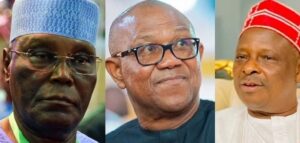Politics2027: Uncertainty Surrounds Atiku, Obi, Kwankwaso Merger Talks
Politics2027: Uncertainty Surrounds Atiku, Obi, Kwankwaso Merger Talks

Recent developments suggest that the anticipated merger between Atiku Abubakar, Peter Obi, and Rabiu Kwankwaso, aimed at uniting the opposition against the ruling All Progressives Congress (APC), may face challenges. The latest hint of trouble emerged when Kwankwaso, the presidential candidate of the New Nigerian Peoples Party (NNPP) in the last election, boldly asserted his intention to win the 2027 presidential race.
FIRSTCLASSGISTS reported that Kwankwaso made this declaration during the inauguration of his party’s secretariat in Katsina State. His visit also included a condolence call to the Yar’Adua family following the death of Hajiya Dada, the mother of the late President Umaru Yar’adua.
Kwankwaso, who has been a key figure sought after by both Atiku and Obi, stated that his party is prepared to claim the presidency and other significant positions nationwide in 2027. He further criticized the Peoples Democratic Party (PDP), declaring it essentially defunct and claiming that his departure was due to the party’s lack of direction.
Prior to Kwankwaso’s statements, the PDP had revealed that discussions were underway among key opposition leaders, including Atiku, Obi, and Kwankwaso, about a potential merger to challenge the APC in the upcoming elections. Ibrahim Abdullahi, PDP’s Deputy National Publicity Secretary, confirmed these discussions during an interview on Channels Television’s Sunrise Daily, noting that if Kwankwaso or Obi had stayed with the PDP, the party might have closed the electoral gap and mitigated current political and economic difficulties.
Abdullahi also mentioned that while ongoing discussions are aimed at reuniting various opposition leaders, the ultimate goal is to address Nigeria’s severe issues, including hunger, poverty, and insecurity. He emphasized that collaboration should focus on solving these problems rather than merely seeking political power.
Peter Obi has expressed that he is not desperate to become Nigeria’s President and is open to collaboration only if it is aimed at effective governance. In a recent interview with News Central Television, Obi indicated that he is willing to support others if they present a better plan for the country, emphasizing that any collaboration must be based on substantive goals rather than mere electoral strategy.
Regarding potential alliances, Obi stated he would only work with individuals or parties committed to addressing critical issues like education and job creation. He also indicated that the nature of any collaboration should focus on productive outcomes rather than state capture.
In contrast, Barr. Ray Nnaji, a PDP chieftain, speculated that an alliance among Atiku, Obi, and Kwankwaso might be challenging, particularly if Kwankwaso demands the presidential candidacy. Nnaji acknowledged that while Atiku and Obi had successfully worked together in the past, Kwankwaso’s past associations and ambitions could complicate potential agreements.
Dr. Yunusa Tanko, former spokesperson for the defunct Labour Party Presidential Campaign Organisation, mentioned that discussions about alliances are ongoing but have not yet reached a definitive conclusion. He stressed the importance of aligning on governance goals and ensuring that any collaboration is driven by a shared commitment to improving Nigeria.
Meanwhile, Hashimu Dungurawa, NNPP’s Kano State Chairman, stated that Kwankwaso’s intentions and potential collaborations are subject to future developments. He emphasized Kwankwaso’s commitment to improving Nigeria’s governance and noted that Kwankwaso has remained independent of the ruling party.
Dungurawa highlighted that Kwankwaso’s political decisions are driven by his dedication to effective leadership and his desire for a better Nigeria, distinguishing him from others who frequently switch parties for personal gain.
TRENDING SONGS
 NPMA Appeals to Nigerian Government for Compensation After Lagos Market Fire
NPMA Appeals to Nigerian Government for Compensation After Lagos Market Fire
 Rest Every Four Hours, FRSC Issues Safety Guide for Fasting Motorists
Rest Every Four Hours, FRSC Issues Safety Guide for Fasting Motorists
 NNPC Boss Ojulari Bags UK Energy Institute Fellowship
NNPC Boss Ojulari Bags UK Energy Institute Fellowship
 Shock in Anambra: Bride Disappears Moments Before Wedding
Shock in Anambra: Bride Disappears Moments Before Wedding
 Nigerian Woman Returns ₦330 Million Accidentally Credited to Her Account
Nigerian Woman Returns ₦330 Million Accidentally Credited to Her Account
 APC Don Reach Morocco?’ VeryDarkMan Reacts to Seyi Tinubu Poster
APC Don Reach Morocco?’ VeryDarkMan Reacts to Seyi Tinubu Poster
 Bride Breaks Down in Tears as Wedding Meals Were Kept Secretly While Guests Go Home Hungry
Bride Breaks Down in Tears as Wedding Meals Were Kept Secretly While Guests Go Home Hungry
 Odogwu by Day, Robber by Night: How Marriage Joy Turned Into Tragedy
Odogwu by Day, Robber by Night: How Marriage Joy Turned Into Tragedy
 Nigerian Officials Allegedly Pocket N4–6B Weekly Through Smuggling Cartels at Seme–Badagry Border
Nigerian Officials Allegedly Pocket N4–6B Weekly Through Smuggling Cartels at Seme–Badagry Border
 Ahmad Yerima: Naval Officer to Face No Sanctions After Clash with Wike – Matawalle
Ahmad Yerima: Naval Officer to Face No Sanctions After Clash with Wike – Matawalle
Share this post with your friends on ![]()













